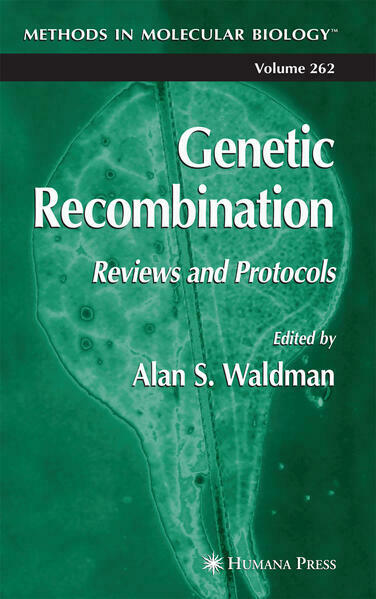Bitte haben Sie einen Moment Geduld, wir legen Ihr Produkt in den Warenkorb.
| Reihe | Methods in Molecular Biology |
|---|---|
| ISBN | 9781617374425 |
| Sprache | Englisch |
| Erscheinungsdatum | 10.11.2010 |
| Genre | Biologie/Mikrobiologie |
| Verlag | Humana Press |
| Herausgegeben von | Alan S. Waldman |
| Lieferzeit | Lieferbar in 6 Werktagen |
| Herstellerangaben | Anzeigen Springer Nature Customer Service Center GmbH ProductSafety@springernature.com |
- ✔ kostenlose Lieferung innerhalb Österreichs ab € 35,–
- ✔ über 1,5 Mio. Bücher, DVDs & CDs im Angebot
- ✔ alle FALTER-Produkte und Abos, nur hier!
- ✔ hohe Sicherheit durch SSL-Verschlüsselung (RSA 4096 bit)
- ✔ keine Weitergabe personenbezogener Daten an Dritte
- ✔ als 100% österreichisches Unternehmen liefern wir innerhalb Österreichs mit der Österreichischen Post
Genetic recombination, in the broadest sense, can be defined as any process in which DNA sequences interact and undergo a transfer of information, producing new “recombinant” sequences that contain information from each of the original molecules. All organisms have the ability to carry out recombination, and this striking universality speaks to the essential role recombination plays in a variety of biological processes fundamentally important to the maintenance of life. Such processes include DNA repair, regulation of gene expression, disease etiology, meiotic chromosome segregation, and evolution. One important aspect of recombination is that it typically occurs only between sequences that display a high degree of sequence identity. The stringent requirement for homology helps to ensure that, under normal circumstances, a cell is protected from deleterious rearrangements since a swap of genetic information between two nearly identical sequences is not expected to dramatically alter a genome. Recombination between dissimilar sequences, which does happen on occasion, may have such harmful consequences as chromosomal translocations, deletions, or inversions. For many organisms, it is also important that recombination rates are not too high lest the genome become destabilized. Curiously, certain organisms, such as the trypanosome parasite, actually use a high rate of recombination at a particular locus in order to switch antigen expression continually and evade the host immune system effectively.
| Reihe | Methods in Molecular Biology |
|---|---|
| ISBN | 9781617374425 |
| Sprache | Englisch |
| Erscheinungsdatum | 10.11.2010 |
| Genre | Biologie/Mikrobiologie |
| Verlag | Humana Press |
| Herausgegeben von | Alan S. Waldman |
| Lieferzeit | Lieferbar in 6 Werktagen |
| Herstellerangaben | Anzeigen Springer Nature Customer Service Center GmbH ProductSafety@springernature.com |
- ✔ kostenlose Lieferung innerhalb Österreichs ab € 35,–
- ✔ über 1,5 Mio. Bücher, DVDs & CDs im Angebot
- ✔ alle FALTER-Produkte und Abos, nur hier!
- ✔ hohe Sicherheit durch SSL-Verschlüsselung (RSA 4096 bit)
- ✔ keine Weitergabe personenbezogener Daten an Dritte
- ✔ als 100% österreichisches Unternehmen liefern wir innerhalb Österreichs mit der Österreichischen Post
Wie gefällt Ihnen unser Shop?



